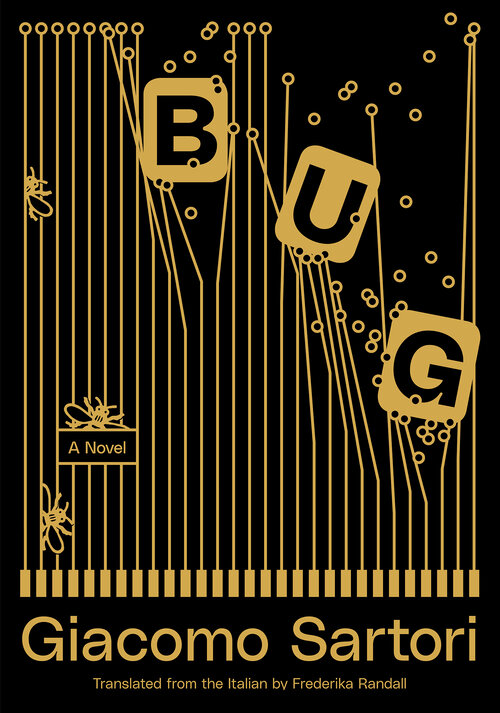
translated from the Italian by Frederika Randall
February 2, 2021
320 pages
grab a copy here or through your local independent bookstore
So many things happen simultaneously in Bug that, with any other writer, this kind of chaos would veer completely out of control (like a rapidly-developing AI consciousness, perhaps?). Sartori, though, juggles it all with calm, confident hands to the very end, producing what is now one of my favorite books of all time, whether speculative or not.
Narrated by a young deaf boy whose mother was badly injured in a car accident (and lies comatose in the hospital), Bug is ultimately about how the narrator navigates an increasing number of family and school crises. His older brother, IQ, is as brilliant as his name suggests (and he’s only 13), and the supercomputer this brother builds eventually generates an AI that calls itself “Bug” and develops at an astonishing rate. Meanwhile, the narrator’s father (who had moved out before the crash but moves back into the chicken coop they call a house), works for Nutella, where his actual job is hunting down terrorists via complex algorithms. With a tendency to bite himself and others down to the bone, the narrator frequently gets in trouble at school, where, despite his special helmet with a neural interface that helps him hear, he often becomes restless and easily distracted.
Eventually, the narrator’s brother gets a lucrative job at a start-up and secures enough sophisticated technology to really get his supercomputer up and running. It’s the narrator, though, who first talks to Bug when the AI messages him on his phone in very broken Italian. What follows is a heartbreaking, hilarious, and at times horrifying story of an AI that grows increasingly frustrated by its physical limitations. In order to please its “father” (IQ) and “brother” (the narrator), Bug messes with their obnoxious neighbor’s garage door, sends threatening messages to the narrator’s vengeful teachers, figures out the right mix of medication to fight the comatose mother’s infection, and hacks into the Bayer company’s website to stop it from continuing to manufacture products that kill bee populations (the mother is a beekeeper as well as a Buddhist).
The narrator frequently refers to a woman (Logo) who is a kind of caregiver and is actually writing the book we are reading (as dictated by the narrator). Because of Logo and the narrator’s worm-researching ex-anarchist grandfather, the boy is able to maneuver through crisis after crisis and continue to hold out hope that his mother will one day wake up.
Despite knowing that IQ is trying to stop “him” from achieving more complex levels of consciousness, Bug works with the narrator to wake the comatose mother (via the narrator’s helmet with the neural interface). I must admit, I thought at this point that the story would go down a particular path, but instead it veered elsewhere, which is totally fine.
When you realize that Bug has attained self-consciousness and is communicating with the narrator–that, my friends, is a truly remarkable moment. It’s that perfect blend of science fiction and horror that is so difficult to achieve. Sartori does it masterfully, and now I want to read his other books available in English.
Also, Bug is now the second work of Italian speculative fiction I’ve read in the past few months (see Dissipatio H. G.) that is available in English, thanks to Frederika Randall and her excellent translations.
So go read Bug. You can thank me later.
